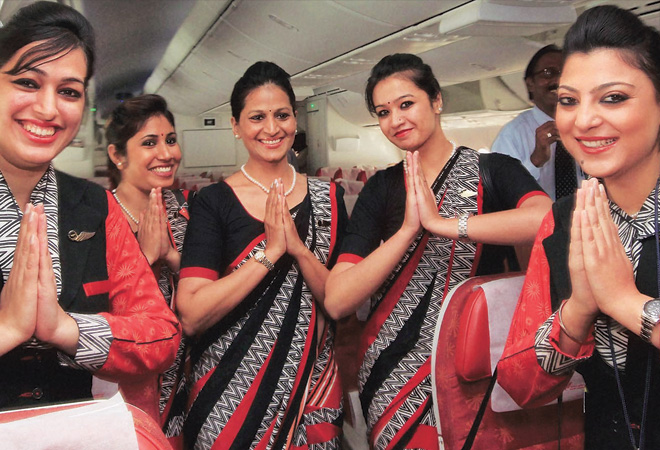

Career in Flight Stewardess and Pilot - Courses, Colleges, Opportunities & Salary
Naief Khatri

The recently-introduced open sky policy of the Government of India has led to opening up of dozens of private players in the aviation sector. All this has resulted in large number of vacancies for qualified cabin crews.
Cabin crews are the first professionals to welcome and greet passengers aboard an aircraft.Primarily, they lend a hand in supervising their seating arrangements and in arranging their hand baggage in the appropriate style.
Once all the passengers are inside the plane, they ensure and check the safety-belt arrangements and also exhibit the use of emergency equipment in case of any emergency.
Members of Cabin crew are also responsible for making essential announcements over the public address system on time to time basis. Generally, their duties and responsibilities start much before the arrival of the passengers as they check that blankets, pillows, magazines, newspapers, etc are in good order and in their correct places. They also supply first aid and serve meals to passengers.
Life of cabin crew is always full of adventure and sightseeing as they often change planes at ‘step-overs’. During those times, they enjoy the liberty of staying at luxury hotels at the airlines’ expenditure.
Many institutes in India offer training programs for grooming candidates for this adventurous profession.
Personal Skills
A sense of responsibility, ability to handle crisis, ability to take initiative and friendly nature are some of key-skills for this profession.
The job of a cabin crew demands lot of dedication and presence of mind as they have to be very alert throughout the length of the flight. Most importantly, as they come across air-sick travelers, sick children and babies and even elderly people, hence they must have strong sympathy towards them.
Eligibility Criteria
Nine times out of ten times, Airlines recruit cabin crew on the basis of the following criteria.
| No. | Criteria | Details |
| 1 | Age | Below 25 years |
| 2 | Height | Minimum 170-180 cms |
| 3 | Weight | As per company standards |
| 4 | Marital Status | Single/Unmarried |
| 5 | Vision/Eyesight | Preferably normal eyesight without glasses; or minimum uncorrected vision (distant) should be 6/24 in each eye |
| 6 | Educational Qualification | Graduate degree from a recognized university OR Plus Two/Equivalent with 3 year diploma in Hotel Management and Catering from a recognized institution |
PILOT
Flying an aircraft is an adventurous career option. However, one needs to be focused and concentrate on the job as you will be responsible for flying hundreds of passengers from one destination to another.
How do I reach my goal?
Step 1: Science is a must in 10 2 with English, Physics and Mathematics as core subjects
Step 2: You have to get at least 50% in your 10 2 board exam to be eligible for a pilot course
Step 3: Undergo pilot training in DGCA approved institutes
Step 4: To get a commercial pilot license it is mandatory to complete 200 hours of flying and clear theory papers. One has to undergo a medical fitness test which is a very tough one.
Step 5: You get further training on the job by working as a co-pilot before becoming a captain.
Do you have it in you
- Physical and mental fitness to fly long hours
- Ability to take split second decisions
- Mental strength and courage to face challenges as that of a hijack to flying in bad weather
- Mastery over machines and equipment.
- Technical bend of mind
Perks
Though starting salaries for commercial pilots might be less for fewer flying hours behind their experience, a co-pilot can expect to get around Rs 80.000 to Rs 1.5 lkh per month. Senior pilots can earn more than Rs 2 lakh per month depending upon the airline. Other than the salary the perks also include flying to new countries and places and meeting new people.
Pros and Cons of a Commercial Pilot
Pros
- Good starting salary
- Exciting job that takes you to new places and countries
- Lots of opportunities within India as the aviation sector is getting a boost
Cons
- Very high training cost which can be anything between Rs 15- Rs 20 lakh
- Fatigue might set in after long hours of flying
- Staying away from family for long periods
- High risk job as you are responsible for the lives of many people
Pilot Training Institutes
- Indira Gandhi Rashtriya Uran Akademi, Uttar Pradesh
- Flying Training Institute, Behala, Calcutta
- Government Aviation Training Institute, Civil aerodrome, Bhubaneswar
- Karnal Aviation Club, Kunjpura Road, Karnal, Haryana
- Government Flying Club, Aerodrome, Lucknow
- School of Aviation Science and Technology, Delhi Flying Club Ltd, New Delhi
- State Civil Aviation, UP Govt Flying Training Center Kanpur and Varanasi
- Rajasthan State Flying School, Sanganer Airport, Jaipur
- Govt Flying Training School Jakkur Aerodrome, Bangalore
- Andhra Pradesh Flying Club Hyderabad Airport, Hyderabad
- Assam Flying Club, Guwahati Airport, Guwahati
- Bihar Flying Institute, Civil Aerodrome, Patna, Bihar
Entrance Exam for admission to Pilot Training Schools:
The test comprises English, General Knowledge, Mathematics, Physics and Chemistry.
Where to work
With the aviation sector getting a boost from the Government in India, commercial pilots are in great demand. You can find work as a commercial pilot in various private airlines and government airlines.
You can also fly in other countries like the UK, US, France provided you obtain a flying license from the country you wish to work in.
Latest News
People Reading Now

CBSE Compartment Result 2023 OUT: Click For Direct Link



CSAB 2023: Special Round Registration Begins Today


